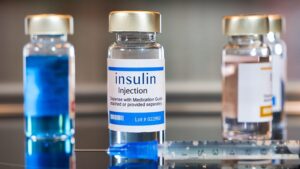January 6, 2022
With the start of another year, many of us will no doubt be making New Year’s Resolutions. For many, these resolutions often centre on making lifestyle changes to improve our health. Smoking cessation is a common New Year resolution. In Canada, 100 Canadians die every day of smoking related illnesses(1). Weedless Wednesday has become a national movement to increase awareness of the harms of smoking and encourage smokers everywhere to quit smoking, even if only for 24 hours. Weedless Wednesday happens each year on the Wednesday of the 3rd full week in January. There are many reasons for quitting smoking. Common reasons include reducing risk for lung cancer and respiratory illnesses, and reducing risk for stroke and heart disease(1). However, there is another reason to consider that is not so well know. That reason is reducing your risk of developing type 2 diabetes.

When we think of risk factors for the development of type 2 diabetes we often think of obesity, family history, and inactivity as risk factors. Smoking doesn’t come to mind. However, over the years there has been mounting evidence that smoking increases the risk for the development of type 2 diabetes. The 2014 Surgeons General’s Report, smoking was cited as a cause of type 2 diabetes. In fact, the number of cigarettes smoked per day increases the risk of developing type 2 diabetes(2). It is thought that smoking increases inflammation in the body and causes oxidative stress(2). Evidence has shown that both inflammation and oxidative stress may be related to increased risk of developing diabetes(2).

It is well known that poorly controlled diabetes (high blood sugars) can lead to several long term complications, such as kidney disease, eye disease, poor blood flow and lower limb amputations. However, when a person with diabetes is also a smoker then the risk of long term complications of diabetes is even greater. Furthermore, when exposed to high levels of nicotine, insulin becomes less effective therefore making glucose control even more difficult(2). That is why larger doses of insulin is often needed in those people with diabetes who also smoke.

Nicotine is one of the most addictive drugs(1). That is why for many, many smokers, quitting smoking is extremely difficult. Today there are several options to help with smoking cessation. These include nicotine replacement therapy (NRT), prescribed oral medications, lifestyle changes and support groups. It is also important to remember that if often takes several attempts to quit smoking before becoming successful. The first important step is to make the decision to quit. The more support you can receive from your family, friends and health care providers then the greater your chance of success!

By: Odilia Almeida BScN, RN, CDE
Supports:
www.gosmokefree.ca
www.smokershelpline.ca
References:
1. Diabetes Canada, Smoking and Diabetes patient resource
2. Centers for Disease Control and Prevention, 2014 Surgeon General report on Smoking and Health
